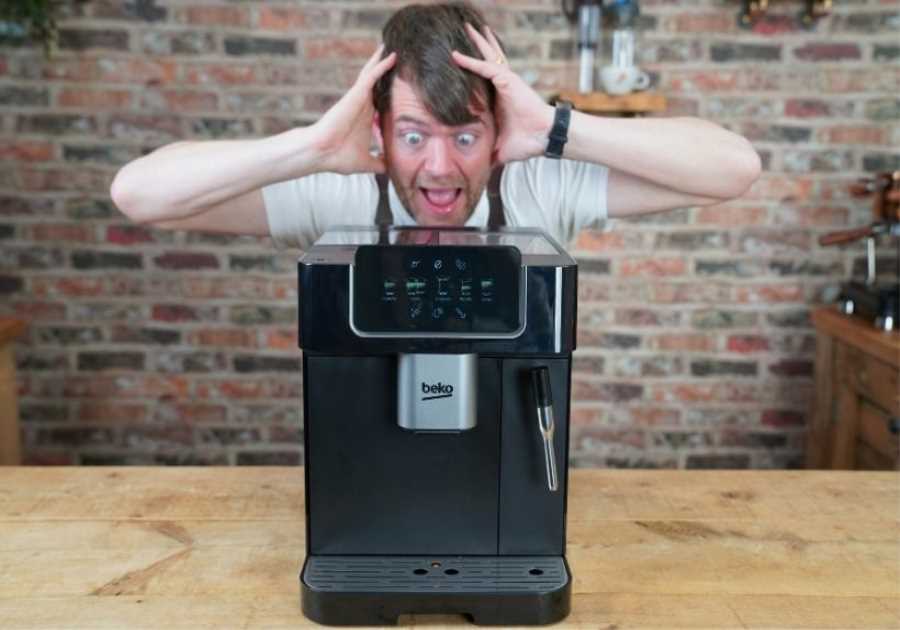When it comes to preparing high-quality espresso shots, baristas have to consider a number of different variables.
Dose, yield, extraction time, grind size, and water temperature are all vitally important. However, sometimes it’s easy to overlook the significance of preparation techniques for espresso – including distribution and tamping.
Many coffee professionals agree that carrying out these techniques properly can help to elevate a good espresso to an excellent one.
To learn more, I spoke with Wesley Farnell, CEO of Eight Ounce Coffee, and Heo JaePil, Roasting Lab Manager at CoffeeMeUp. Read on for more of their insight.
You may also like our article on channelling and how it affects espresso extraction.
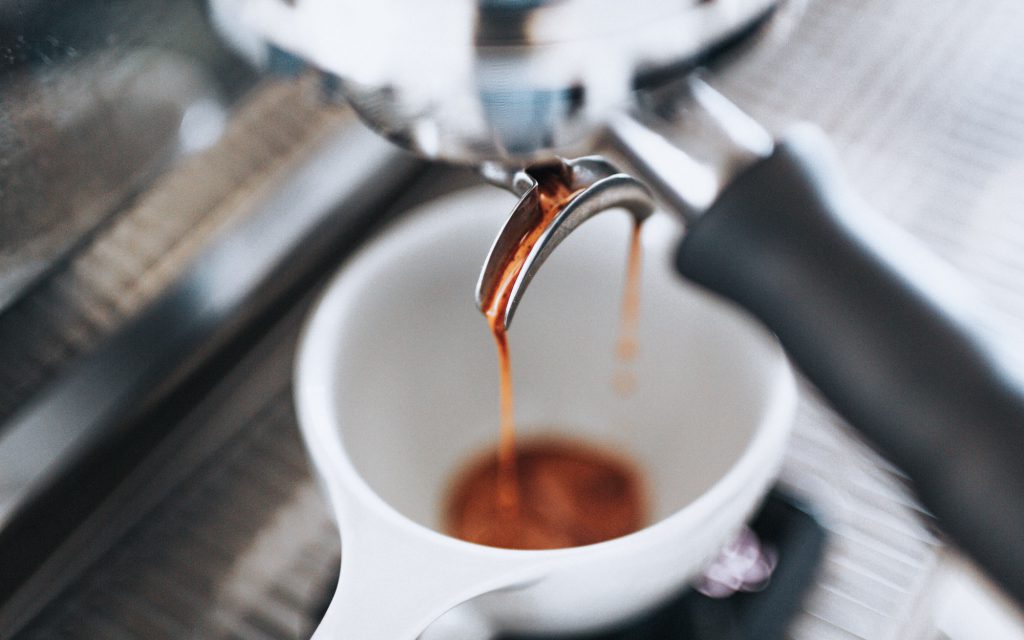
What is distribution and why is it so important for excellent espresso?
First and foremost, before tamping your coffee to make espresso, you need to carry out some kind of distribution technique. In simple terms, once you have dispensed ground coffee particles into a portafilter basket, distribution is the practice of evenly dispersing them. There are a number of ways to do this:
- Lightly tapping the portafilter basket against your hand or on a flat surface
- Use the base of your index finger to push the grounds around in a North-South-East-West motion. This is known as the NSEW method
- The Stockfleth method is similar to the NSEW method, but also involves rotating the portafilter against the base of your index finger
- The Weiss Distribution Technique, which uses needles or similar utensils to stir ground coffee in a portafilter
As well as creating a more even bed of ground coffee before tamping, distribution also helps to remove any clumps. When ground coffee particles clump together, they can hinder extraction, which means you can’t get the best results from your coffee.
“Clumps can form as a result of static build up from the grinder,” Heo says. “You need to break up the clumps to create an even density of ground coffee to extract your espresso evenly.”
Wesley also explains why distribution is so important for preparing high-quality espresso.
“The density of ground coffee particles affects how water flows through the puck,” he tells me. “This can have a significant impact on the taste and quality of your espresso.”
When ground coffee is unevenly distributed in a portafilter basket, the density of ground coffee will inevitably vary. For instance, some parts will be less dense than others, while other areas might contain significantly more ground coffee.
How does channelling happen?
If this happens, channelling can occur. This is when water finds the path of least resistance through the puck, meaning that it will avoid moving through the more densely packed areas.
Instead, the water will extract the parts of the coffee bed which are less dense, resulting in both under and overextracted coffee.
“Proper distribution helps to prevent channelling and ensures that water flows more evenly throughout the coffee bed,” Wesley explains. “This means flavours and aromas can be extracted evenly from all of the ground coffee particles, which leads to a well-balanced and flavourful espresso.”
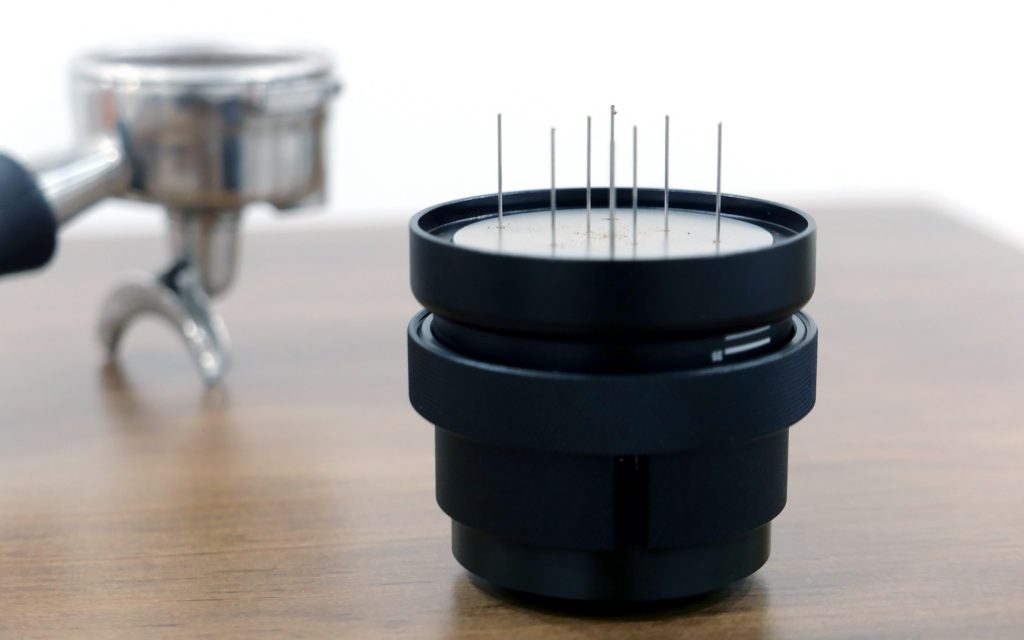
Why is the Weiss Distribution Technique so popular?
Although there are many distribution methods, arguably the most commonly used is the Weiss Distribution Technique (WDT). There are several WDT tools available on the market, including Duomo the Eight.
“This method has become popular among baristas in specialty coffee because it helps to improve the consistency and quality of your espresso,” Wesley tells me.
Heo agrees, saying: “It’s often more effective than other distribution tools because some only distribute the upper layers of the grounds.”
However, as WDT tools have around five needles to stir coffee grounds in a portafilter basket, they are able to evenly distribute grounds from top to bottom, as well as side to side.
Wesley also says one of the main reasons that WDT tools have become so popular is because they help to improve the consistency of espresso shots. When ground coffee particles are distributed more evenly, baristas can achieve a more repeatable extraction. This results in a more consistent flavour profile.
“This technique can also be particularly helpful when working with lighter roasts or single origin coffees, which can be a little more prone to channelling,” Wesley adds.
Heo agrees, telling me: “Usually with light roast coffees, the extraction yield is lower than with darker roasts.
“When you use the WDT, the extraction yield can increase, so you can therefore extract more flavours,” Heo adds.
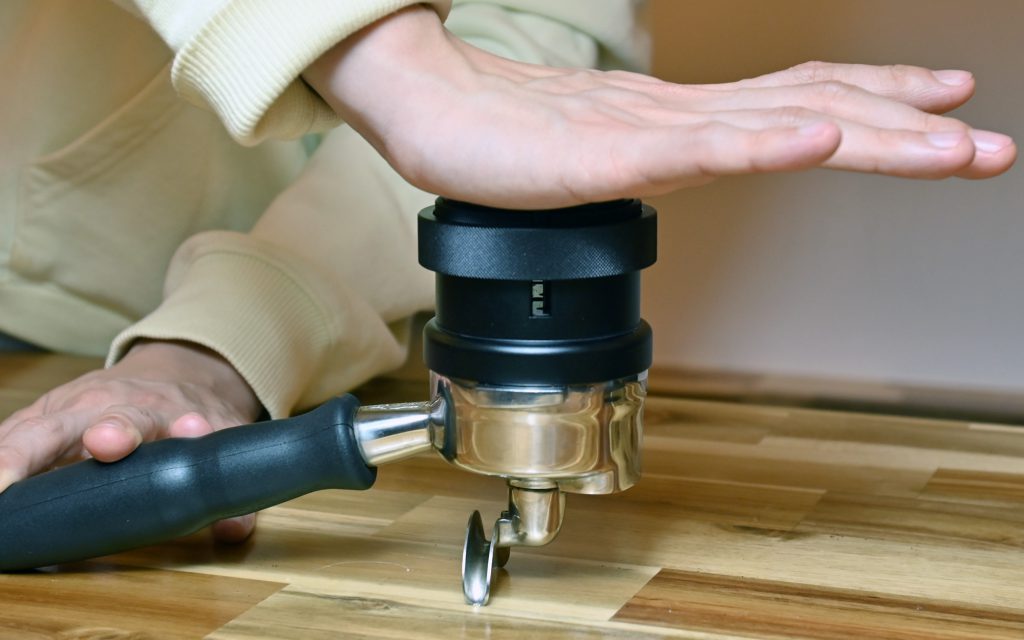
Why is tamping also essential for pulling high-quality espresso shots?
As well using proper distribution techniques, tamping is also a vital part of preparing excellent espresso.
Effectively, tamping is when you apply force to ground coffee in a portafilter basket, which compresses them.
“By tamping the grounds, you create more resistance on the surface of the puck against the flow of water,” Heo says. “This way, extraction starts after there is a slight build up of pressure, which can help to prevent channelling.
“You also need to tamp to create enough headspace in the portafilter,” he adds. “If there isn’t enough headspace, the surface of the puck will come into contact with the screen in the grouphead, which may cause it to crack and create an uneven extraction.”
However, if you tamp improperly or unevenly, it can impede extraction, and thereby cause a loss of flavours and aromas.
“If coffee grounds are not evenly tamped, the water may flow through the puck unevenly – resulting in an inconsistent extraction and a poorly prepared shot of espresso,” Wesley says.
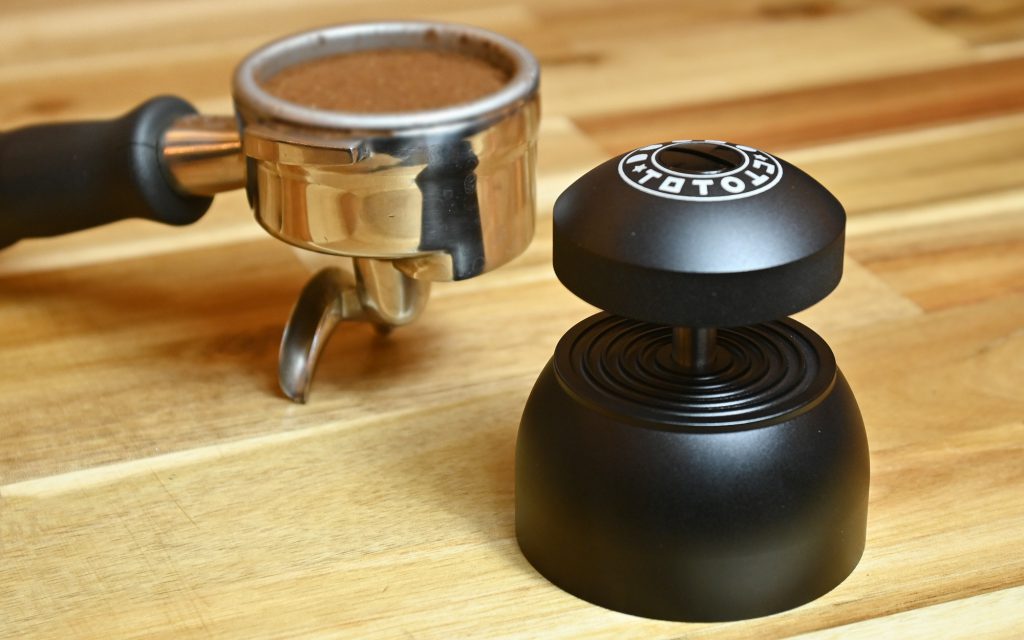
Why is it so important for baristas to invest in high-quality distribution and tamping equipment?
Although carrying out proper tamping techniques – such as applying consistent and even force – is essential to extract excellent espresso shots, using high-quality tamping equipment is also important.
“Investing in high-quality distribution and tamping equipment like Duomo the Eight and Duomo the Tamper will improve the quality and consistency of your espresso shots,” Wesley tells me.
The Duomo the Eight WDT tool was used by several competitors at the 2022 World Barista Championship, as well as a number of national Barista Championships competitors in the same year.
Wesley explains how to use Duomo the Eight.
“After dosing and tamping, place the Duomo the Eight WDT tool on top of the portafilter basket,” he says. “Push down the top of the tool and then turn the top handle.
“The amount of times you turn will depend on the coffee you’re using,” he adds. “However, we have experienced the best results from turning five times in one direction, and then five times the other way.
“Once finished, you take the Duomo the Eight off the portafilter basket and place it back on its base,” Wesley continues. “If necessary, you can push the needles onto the cleaning brush and rotate to remove coffee grounds.”
Duomo the Tamper, meanwhile, received the 2022 SCA Best New Product Award. The two-in-one WDT tool and tamper uses eight needles to evenly distribute coffee grounds in a portafilter.
“Duomo the Tamper is designed to work in a similar way to Duomo the Eight, but the tamper is designed to slide over the needles to create an even tamp without the need for a separate tamper,” Wesley tells me. “It also helps baristas to tamp with precise and accurate pressure, which is crucial to produce high-quality espresso shots.”
Benefits of using WDT tools and tampers for espresso
There are certainly a number of benefits to using WDT tools and tampers in your puck preparation routine.
“With high-quality distribution and tamping equipment, baristas can work more efficiently and effectively,” Wesley says. “They can pull more espresso shots in less time without compromising on quality, even in fast-paced environments.
“Investing in high-quality equipment means it will last longer,” he adds. “Ultimately, this means less frequent repairs or replacements, saving you money in the long run.”
Tools like Duomo the Eight and Duomo the Tamper have adjustable needles, which means they can fit a range of portafilter depths. Moreover, you can replace or repair each needle individually.
Tips for using these tools
When it comes to tamping in particular, most coffee professionals agree that around 30lbs (13kg) of force is needed to tamp correctly. However, as long as you are applying enough force to compress the coffee grounds, it is arguably more important to tamp using consistent pressure.
As baristas carry out a number of tasks which require repetitive movements, such as tamping and placing portafilters into groupheads, there is the risk of repetitive strain injury (RSI). With this in mind, tampers and WDT tools should be designed to minimise the risk of RSI.
“Duomo the Tamper and Duomo the Eight are designed with ergonomic features that make them comfortable and easy to use for long periods, reducing the risk of RSI,” Wesley explains.
Similarly, Heo some advice on how to get the best results from your distribution and tamping techniques.
“Relax your wrist and don’t rush,” he says. “The most important thing is to memorise your techniques and movements, taste all the espresso shots you extract, and make notes about anything you did to change the flavours.
“Only after understanding the extraction process and practising enough will you see great results,” Heo adds.
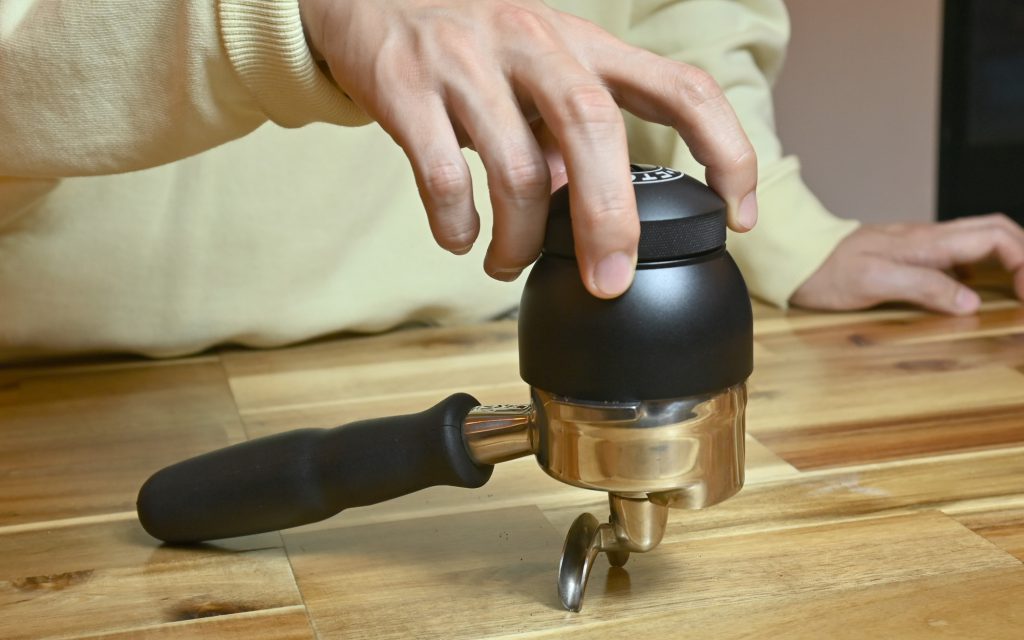
Along with several other important extraction variables, tamping and distribution are a crucial part of preparing excellent espresso.
By investing in equipment – such as high-quality WDT and tamping tools – you can ensure you get the best out of your coffee with every shot of espresso.
Enjoyed this? Then read our article on the Weiss Distribution Technique and why you should use it before tamping coffee.
Photo credits: Duomo
Perfect Daily Grind
Please note: Duomo is a sponsor of Perfect Daily Grind.
Want to read more articles like this? Sign up for our newsletter!
The post Why are distribution and tamping so important for quality espresso? appeared first on Perfect Daily Grind.
By: Melina DevoneyTitle: Why are distribution and tamping so important for quality espresso?
Sourced From: perfectdailygrind.com/2023/03/why-are-distribution-and-tamping-important-for-espresso/
Published Date: Tue, 28 Mar 2023 05:30:00 +0000

